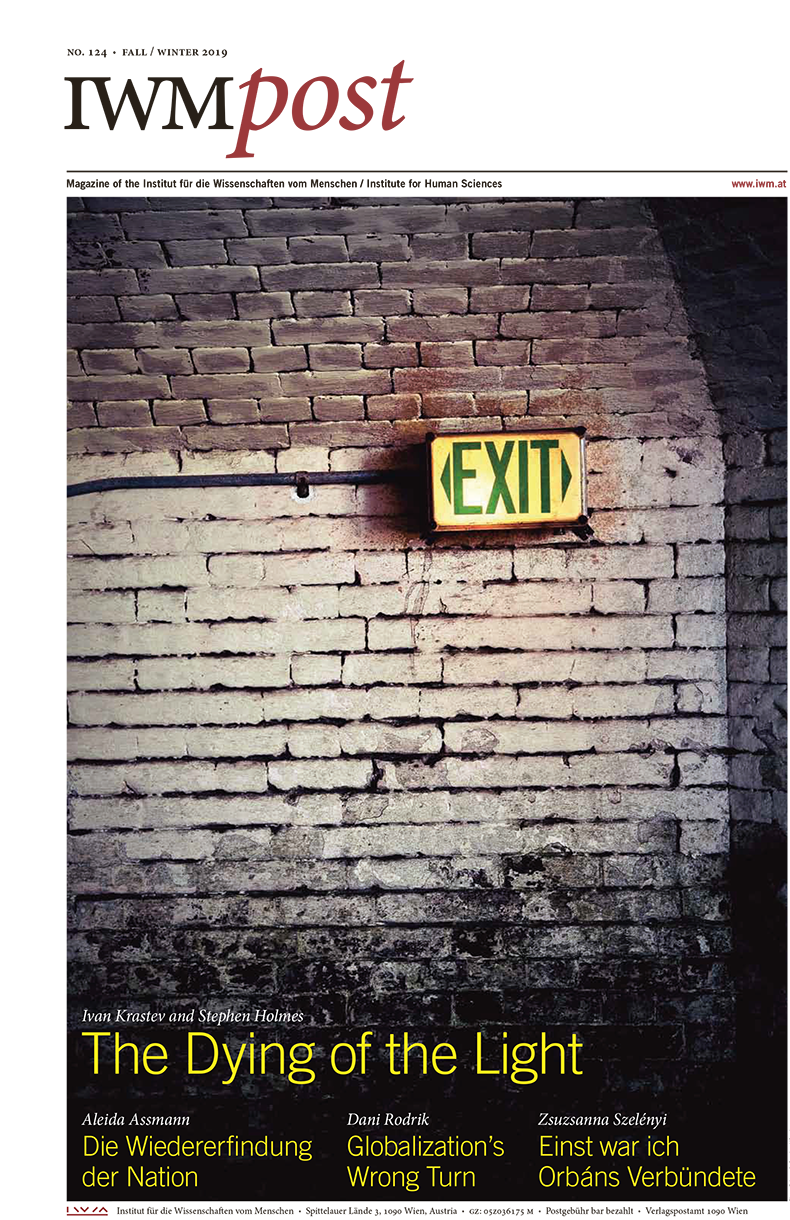What if we were wrong? What if the hope that the end of the Cold War was the beginning of an age of liberalism and democracy was just an illusion?
This question is posed by Ivan Krastev and Stephen Holmes in their latest book The Light that Failed, which is presented with an excerpt in this issue of IWMpost. Ivan Vejvoda’s, Ludger Hagedorn’s and Zsuzsanna Szelényi’s contributions also deal with the anniversary year 1989, which was celebrated at the IWM with a week full of events. Another focus of this issue is on the future of democracy. While Aleida Assmann warns us not to cede the nation to the nationalists, the edited volumes Brexit: Farce und Tragödie and Urbaner Protest: Revolte in der neoliberalen Stadt, published by the IWM, deal with the causes and consequences of the British exit vote and the growing frustration with neoliberal politics. Branko Milanović (in an interview with Shalini Randeria) has also devoted himself to the issue of global inequality. He calls for a new approach, as does Dani Rodrik, who writes about globalization’s wrong turn. Laura Ștefănuț describes the concrete results of neoliberal politics by using the example of the Romanian garement industry. Bernd Marin and István Adorján discuss the problems and opportunities that demographic change brings with it. As Jakub Jirsa shows, universities are also facing major challenges, as they are confronted with growing mistrust.
Further articles analyze the historical and social backgrounds of current political developments. While Andrei Soldatov and Irina Borogan examine Russia’s relationship with its diaspora, Galip Dalay addresses Russia’s strategic relationship with Turkey. The extent to which the new President Volodymyr Zelensky has succeeded in bringing a new tone to Ukrainian politics is the subject of Kateryna Mishchenko’s contribution. Neloufer de Mel, on the other hand, examines the impact of the terrorist attacks in Sri Lanka on the Muslim population and especially on women. Finally, Holly Case undertakes a thought experiment and asks how we as a society can not only be part of the problem, but perhaps also part of the solution.
Anita Dick
Marion Gollner
Download the IWMpost 124 as a PDF
Contents
The Future of Democracy
Die Wiedererfindung der Nation / von Aleida Assmann
Unheil und Hoffnung / Vienna Humanities Festival
Brexit – Farce und Tragödie / von Ivan Vejvoda
Kontrolle vs. Kooperation: Das Brexit-Mantra und seine Folgen / von Kalypso Nicolaïdis
Irland und die Englische Frage / von Fintan O’Toole
Urbaner Protest: Revolte in der neoliberalen Stadt / von Ayşe Çağlar
Metropolitane Rebellionen und die Stadt als Gemeingut / von James Holston
On Universities and Trust / by Jakub Jirsa
A Short Story about a Different World / by Holly Case
Globalization and Inequality
Ungleichheit zur Sprache bringen / Interview with Branko Milanović by Shalini Randeria
Globalization’s Wrong Turn and Why We Can’t Have It All / by Dani Rodrik
Why Workers Are Fleeing Romania’s Garment Industry / by Laura Ștefănuț
1989 and Its Legacy
1989 in a Week: The Wind of Change That Transformed Europe / by Ludger Hagedorn
Annus Mirabilis: The Road to 1989, and Its Legacy / by Ivan Vejvoda
The Dying of the Light / by Ivan Krastev and Stephen Holmes
Einst war ich Orbáns Verbündete / von Zsuzsanna Szelényi
Demographic Change
Democracy and Demography at a Crossroads / by István Adorján
Zur Relativität des Alter(n)s und demografischen Wandels / von Bernd Marin
Global Perspectives and World Politics
The Easter Attacks in Sri Lanka: Gendering the Aftermath / by Neloufer de Mel
The Compatriots: Russia’s Policy Towards Its Diaspora / by Andrei Soldatov and Irina Borogan
Turkey and Russia: Where the Relations Are Heading / by Galip Dalay
Made in a Dream Factory / by Kateryna Mishchenko
Upcoming Events
Impressum
Editors: Marion Gollner, Anita Dick
Editorial Assistance: Clemena Antonova, Simon Garnett, Lukas Huber, Christina Pössel, Max Feldmann, Evangelos Karagiannis, Kate Younger.
Design: steinkellner/zotter, www.steinkellner.com
Printed by Grasl FairPrint, 2540 Bad Vöslau.
IWMpost is published two times a year.
Current circulation: 66,000
